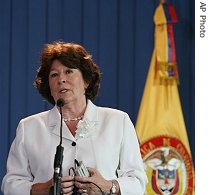-
(单词翻译:双击或拖选)
Geneva
13 September 2007
In a speech to the United Nations Human Rights Council, High Commissioner1 Louise Arbour expressed her concerns about serious rights violations2 in the Democratic Republic of Congo, Iran and Burma. Lisa Schlein reports for VOA from Geneva where the Council began a three-week session on Monday.
 |
| Louise Arbour, 09 Sep 2007 |
Arbour, a former U.N. war crimes prosecutor3, is adamant4 that those who commit crimes should be punished. Last year, she visited the Democratic Republic of Congo. She said the trip focused primarily on the question of impunity5.
She expressed her dismay that since her visit, no progress has been made in getting justice for the many victims of human rights abuse.
"I continue to be concerned with the lack of progress in the DRC," said Arbour. "None of the perpetrators of the serious crimes committed during the first six months of 2007 have been arrested and brought to justice. Interference by military and political authorities in the administration of justice is prevalent, particularly in high-profile cases. Recent trials raise serious questions about the independence of the judiciary."
In July, Arbour's office issued a report accusing Congolese soldiers and police of having used excessive and indiscriminate lethal6 force to suppress clashes in western Bas-Congo province. In January and February, 105 people were reportedly killed during demonstrations7 there.
Arbour visited Iran earlier this month. Government restrictions8 on dissent9 are reportedly increasing there. In meetings with government officials, the High Commissioner said she told them they have to protect the right to peaceful public expression. She said she expressed particular concern about the execution of juveniles10.
Iran's tough Islamic law applies the death penalty for crimes such as murder, rape11, adultery, armed robbery and drug smuggling12, even to young people.
During her speech, Arbour expressed dismay at the suppression of peaceful protest in Burma. She once again urged the authorities to release detainees and political prisoners and to ensure respect for fundamental rights.
During the session, the 47-member Council will examine the human-rights records of a number of countries and look at global phenomena13 such as torture, disappearances14, arbitrary arrest and extra-judicial executions.
 收听单词发音
收听单词发音
1
commissioner

|
|
| n.(政府厅、局、处等部门)专员,长官,委员 | |
参考例句: |
|
|
|
2
violations

|
|
| 违反( violation的名词复数 ); 冒犯; 违反(行为、事例); 强奸 | |
参考例句: |
|
|
|
3
prosecutor

|
|
| n.起诉人;检察官,公诉人 | |
参考例句: |
|
|
|
4
adamant

|
|
| adj.坚硬的,固执的 | |
参考例句: |
|
|
|
5
impunity

|
|
| n.(惩罚、损失、伤害等的)免除 | |
参考例句: |
|
|
|
6
lethal

|
|
| adj.致死的;毁灭性的 | |
参考例句: |
|
|
|
7
demonstrations

|
|
| 证明( demonstration的名词复数 ); 表明; 表达; 游行示威 | |
参考例句: |
|
|
|
8
restrictions

|
|
| 约束( restriction的名词复数 ); 管制; 制约因素; 带限制性的条件(或规则) | |
参考例句: |
|
|
|
9
dissent

|
|
| n./v.不同意,持异议 | |
参考例句: |
|
|
|
10
juveniles

|
|
| n.青少年( juvenile的名词复数 );扮演少年角色的演员;未成年人 | |
参考例句: |
|
|
|
11
rape

|
|
| n.抢夺,掠夺,强奸;vt.掠夺,抢夺,强奸 | |
参考例句: |
|
|
|
12
smuggling

|
|
| n.走私 | |
参考例句: |
|
|
|
13
phenomena

|
|
| n.现象 | |
参考例句: |
|
|
|
14
disappearances

|
|
| n.消失( disappearance的名词复数 );丢失;失踪;失踪案 | |
参考例句: |
|
|
|















